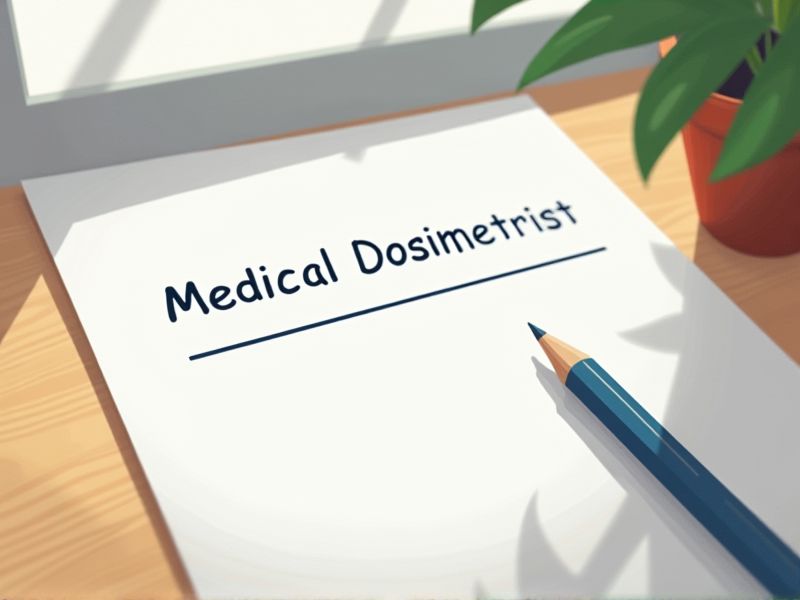
In the field of medical dosimetry, precision and accuracy are crucial for effective treatment planning and patient safety. Certifications help validate a dosimetrist's expertise, ensuring they are well-trained in the latest techniques and technology. The evolving nature of cancer treatments also demands that dosimetrists continuously update their skills and knowledge. Here are several key certifications that aspiring Medical Dosimetrists should consider obtaining.
Certified Medical Dosimetrist (CMD)
The presence of a Certified Medical Dosimetrist ensures precise calculation and planning of radiation doses for cancer treatment, enhancing patient safety. Certification indicates adherence to rigorous standards, improving the accuracy of complex treatment plans. Certified professionals bring specialized knowledge, reducing the risk of treatment errors and increasing treatment efficacy. CMDs contribute to a multidisciplinary team approach, fostering better communication and collaboration among healthcare providers.
ARRT Radiation Therapy Certification
ARRT Radiation Therapy Certification serves as a foundational qualification for medical dosimetrists, ensuring they have a comprehensive understanding of radiation safety and patient care protocols. Knowledge of radiation therapy principles is crucial for precise and effective treatment planning in dosimetry. Certified medical dosimetrists typically meet higher professional standards, increasing trust and confidence among patients and healthcare teams. Certification often aligns with regulatory requirements, promoting adherence to industry standards and enhancing job prospects.
Basic Life Support (BLS) Certification
Basic Life Support (BLS) certification equips medical dosimetrists with essential skills to respond effectively during cardiac or respiratory emergencies. Their role often involves working in clinical settings where immediate intervention could be crucial to patient outcomes. Having BLS knowledge ensures they can provide timely assistance alongside the medical team, thus enhancing overall patient safety. As healthcare standards emphasize comprehensive emergency preparedness, BLS certification becomes a critical qualification for medical dosimetrists.
Advanced Cardiac Life Support (ACLS) Certification
ACLS certification equips a Medical Dosimetrist with the necessary skills to respond effectively to cardiac emergencies in clinical settings. This certification enhances collaboration with healthcare teams during critical events, ensuring comprehensive patient care. Understanding advanced life support protocols can minimize risks during complex radiation therapy sessions. A dosimetrist with ACLS certification increases overall patient safety by being prepared for unforeseen cardiac complications.
Dosimetry Software Proficiency Certification (e.g., Eclipse, Pinnacle)
Proficiency in dosimetry software like Eclipse or Pinnacle ensures accurate treatment planning, which directly impacts patient safety and treatment effectiveness. Certified Medical Dosimetrists demonstrate a standardized skill level, reducing the risk of errors in radiation dose calculations. As medical technology evolves, proficiency certification helps professionals stay current with the latest software developments and best practices. Certification enhances collaboration within the medical team, as a common level of understanding facilitates more efficient workflow and communication.
HIPAA Compliance Certification
Medical dosimetrists handle sensitive patient data while planning radiation treatments, necessitating HIPAA compliance to ensure confidentiality and security. The certification validates their understanding of regulations, preventing unauthorized access to personal health information. Non-compliance might lead to significant legal and financial repercussions for healthcare entities. Proper certification enhances patient trust and upholds the integrity of healthcare operations.
Radiation Therapy Quality Assurance (QA) Certification
Certification in Radiation Therapy Quality Assurance for Medical Dosimetrists ensures adherence to standardized safety protocols, reducing the risk of radiation exposure errors. With certification, dosimetrists demonstrate proficiency in planning and delivering precise radiation doses, which enhances treatment effectiveness. It leads to increased trust with patients and medical teams, as certified professionals are perceived as more credible. More facilities require certified staff to maintain compliance with industry regulations and best practice guidelines.
Radiation Safety Officer (RSO) Certification
Radiation Safety Officer (RSO) Certification equips Medical Dosimetrists with expertise to manage and mitigate radiation risk, ensuring patient and staff safety. Certifying as an RSO enhances their understanding of regulatory compliance, vital for avoiding legal and operational pitfalls in medical facilities. The certification strengthens dosage accuracy, crucial for effective treatment planning and patient outcomes. RSOs play a critical role in fostering a safety culture within healthcare settings, aligning with institutional safety protocols and standards.
Advanced Dosimetry Techniques Certification
Advanced Dosimetry Techniques Certification enhances a medical dosimetrist's understanding of complex radiation treatment plans, ensuring optimal patient safety and care. Certification signifies mastery in the latest dosimetry technologies, which directly improves treatment accuracy. It also keeps professionals informed of evolving industry standards and regulatory requirements, which impacts compliance and patient outcomes. Earning the certification can lead to career advancement opportunities, increasing job security and satisfaction.
Clinical Dosimetry Certification
Clinical Dosimetry Certification ensures that a medical dosimetrist possesses the technical knowledge and skills necessary for accurate treatment planning. The certification process verifies that dosimetrists stay current with advancements in radiation therapy technologies. Hospitals and clinics often require certified professionals to maintain high standards of patient safety and treatment efficacy. Certification enhances trust and credibility within the healthcare team and among patients receiving treatment.
Summary
By obtaining certifications, you, as a Medical Dosimetrist, can significantly enhance your professional credibility and marketability. Certification often leads to improved job prospects and potential salary increases due to recognized expertise. Your ability to ensure accurate and effective radiation treatment plans is validated, boosting patient trust and care outcomes. The certification process also keeps you updated with the latest advancements in dosimetry, fostering continual professional growth and compliance with industry standards.
